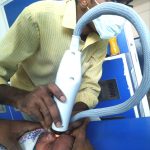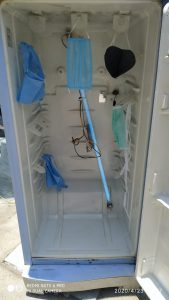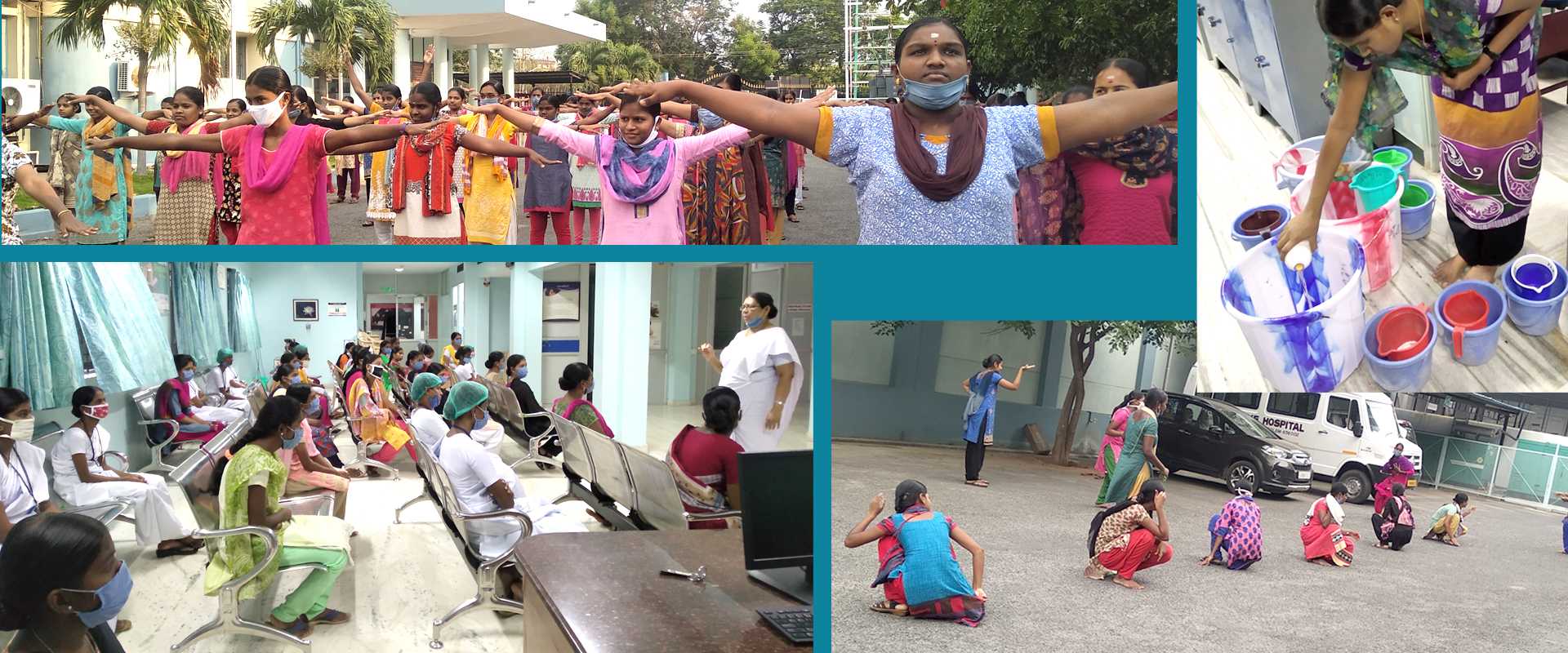
Lock down activities at Aravind-Salem
Gearing up for the days to come
Salem along with Chennai, Madurai and Coimbatore, is one of the hot spot districts identified by the Ministry of Health, Govt. of India in the spread of COVID-19. On a normal day, Aravind Eye Hospital, Salem caters to 550 patients. Now, amid the complete lock down, the ever busy-halls and corridors of the hospital remain vacant. The hospital continues to offer emergency care, and in spite of the travel restrictions, receives an average of 50 patients per day. Just enough staff are posted on a rotation basis to make sure that these patients are taken care of.
Anticipating return to normalcy from May 4th, we have started to plan how to handle as patient load returns to normalcy. Most important among them being, aeration of our basement clinics in which 50% of our patients are seen. We need to change our style of working from the pre COVID days – what we have been practicing for the past several weeks after the COVID outbreak – maintaining social distance among both patients and healthcare personnel, healthcare personnel donning PPE during patient care, scheduling of patients will be the new culture/norm in the future. The road to normalcy with regards to in-patient admissions, routine surgeries, and outreach camps will be bumpy, with the support of think tank of all senior members of AECS, we are confident that, it can be achieved.
Manohar Babu and Salem Team
A day at work during lock down
Extreme care is taken at the hospital to ensure that the universal protocols (with adaptations to suit ophthalmic care guided by AECS think tank) developed towards preventing the spread of COVID-19 are being strictly implemented and monitored.
Patients are admitted into our facility after hand washing with soap and water- then enter the triaging area– at the entrance and MRD registration area- where four MLOPs are posted– two for triaging/ history collection on theprescribed form/ temperature measurement,oneeach for escorting and vision screening.
Vision screening and doctor examination are performed at the MRD area/reception by three MLOPs and two doctors where infectious (conjunctivitis) patients are seen.
After examining each patient, slit lamps/ stools, patient waiting chairsis decontaminated. So are the floors once every two hours.
In unit 1- patients without infectious conditions are seen. Two medical officers, two PGs and two fellows are posted every day. PGs and Fellows take care of the general patients. Medical officers look after the opinion cases along with their respective specialities. Clinic counsellors facilitate appointments for speciality patients when the respective speciality doctor is available.
Necessary PPEs are donned by all doctors/ MLOPs/ support staff- cleaners and security.
Emergency surgeries like corneal / scleral tear repair, phacolytic glaucoma, cataract surgery for bilaterally blind happen on a nearly day-to-day basis.
Reaching out
With the hospital suspending its routine activities and outpatient services, we had to reach out to our existing specialty patients who need constant monitoring and follow-up. Newer ways were implemented to reach out to patients. Making use of the advanced technology, e-consultation through Aravind website and WhatsApp have been put in place.
To promote e- consultation and scheduling patients- enquiry calls to the hospital land line telephone number are routed to 3 counsellors- with dedicated intercoms- a. they answer patient queries after viewing their EMR records, b.give appointments (schedule), c. inform the patient regarding e-consultation, d. transfer the call to a doctor (posted in e-consultation) if a patient needs to speak to the doctor, and ends the call. A SMS is sent to the patient with details of how to access e-consultation – through our website www.aravind.org/e-consultation.
Patients also reach out through whatsapp for queries and advice. A dedicated telephone number has been provided, patients can clear their doubts through chats, video or voice call. As a way of announcing this service, messages were sent to whatsapp numbers of patients who underwent surgeries/ procedures in the past 1 month.Awareness was also created through social media- Facebook.An MLOP and a doctor who are posted in e-consultation attend these calls.The response is good with an average of 10 video calls and 25 audio calls/ chats every day.
Admin staff posted on rotational basis provide necessary support for patients to configure the e-consultation facility in their mobile phones.
RoP Screening
Despite lock down, Aravind-Salem continues RoP screening in NICUs of various hospitals.Our team screened a total of 26 new babies and 33 babies were reviewed. Three babies were given intra-vitreal injections at the hospital.
Spirit of Innovation
The team made a UV light decontaminator by remodeling a condemned refrigerator. Refrigerator cabinet was procured from a resale shop. UV Light 30W was fixed as prescribed by the Centre for Disease Control and Prevention (CDC). Display clips used in the optical shop were fixed inside to hang the masks/ respirators. The setup is completely cleaned/ fumigated and is now being used to decontaminate the used respirators and masks!!!!
Cost of the fridge – Rs.300/ and bulb Rs.600. Just Rs.400 was spent towards assembling the set up. In short, with just Rs.1,300 a UV light decontaminator was made in-house which is being put to the best use.
MLOP Engagement
Care of MLOPs -125 of them – and engaging them productively was a challenge during the initial days.
On the academics side, first and second year trainees undergo revision of all subjects and examination. Skill assessment was done for first year employees. An awareness session on COVID-19 is being arranged every day and Dr. Manohar Babu briefs them on the current state of affairs.
Adequate mentoring and follow-up is taken to make sure that they follow social distancing and other hygienic measures.Any health complaints are closely monitored and provided appropriate treatment. Extra care is taken to provide them with nutritious food.
The MLOP’s start the day at 6.00 am, with an hour each of meditation and physical exercises. Then it is study time for trainees and duty for employees. At 4.00 pm they are out playing games – throw ball, volleyball, tennikoit, kho- kho and some native games. Like we do for Auroutsav, MLOPs are divided into five groups and they are encouraged to participate in various competitions. Prizes for the winners will be distributed later. After dinner at 7.00 pm it is television time till 9.30 pm.All along social distancing is rigorously monitored.














